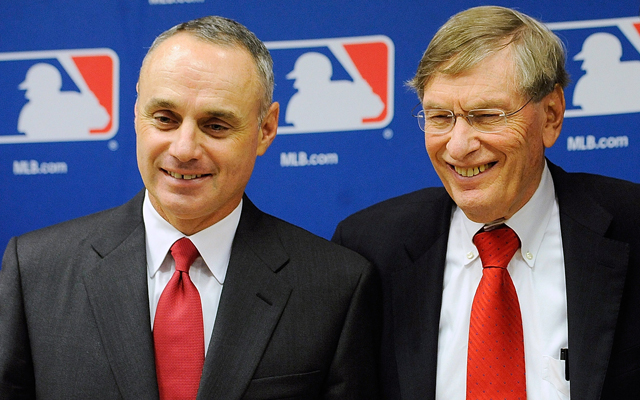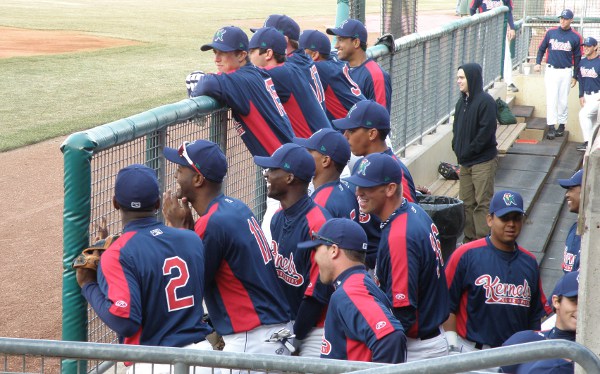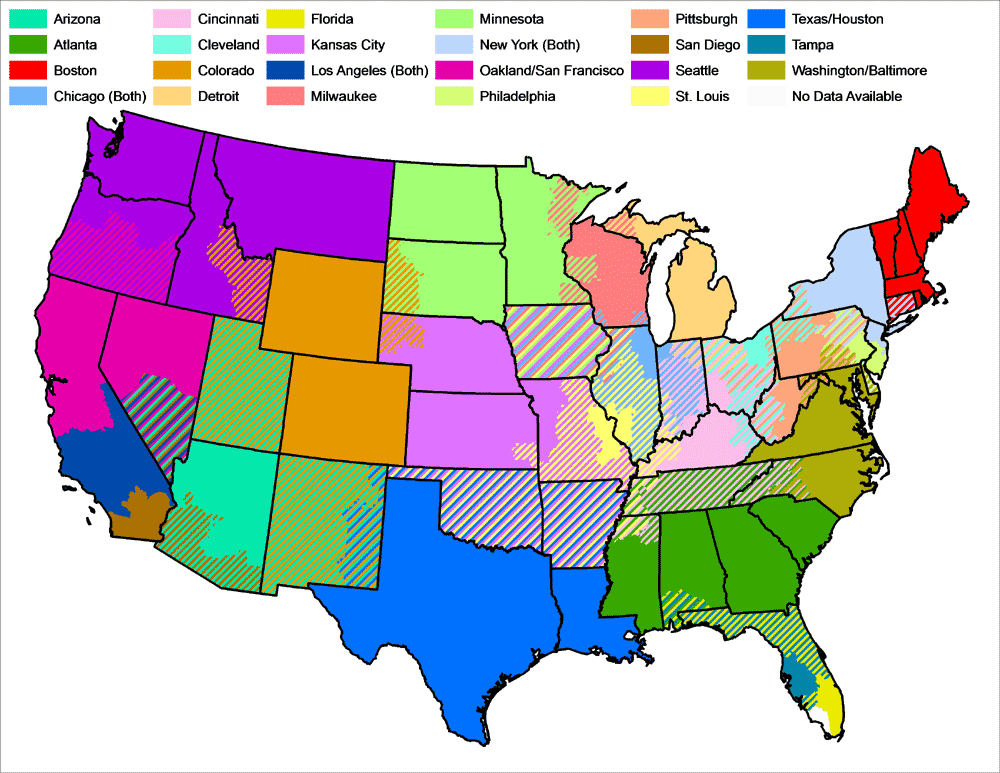In case you missed it, there’s a new Commissioner of Major League Baseball.
I know that, for many fans, that may come as a shock. There are fans that legally enjoy a brew or two at ballgames who have never attended a big league game that wasn’t played under rules dictated by Bud Selig. If it’s true that, “the exception proves the rule,” then that applies to Bud Selig’s role in “proving” the Peter Principle. There’s no other way to explain that man surviving 22 years as Commissioner of Baseball.

But today is not the day to trash Selig. Today we humbly beseech his replacement, Rob Manfred, to finally do something about a couple of the most outdated and ill-advised Selig policies. These are two issues that I have long felt were the dumbest, most indefensible of all MLB policies and yes, I’ve written here about both before – several times, in fact.
I’m referring to baseball’s policies concerning compensation for minor league players and their MLB.tv blackout policy.
These two issues are illogical, at best, and offensive, at worst, in the way that they reflect MLB’s low views of the value they place on two of the assets most critical to the game’s long-term viability – their future players and their current & future fan base.
FOX Sports writer Jon Paul Morosi posted an article recently that listed a number of issues that Morosi felt Manfred should focus on as he inherits Selig’s throne atop Major League Baseball. I may disagree with Morosi’s view concerning Selig’s legacy, but his list of topics where Manfred could make improvements included a number of valid possibilities.
Unfortunately, it did not include any mention of paying minor leaguers even minimum wage, much less a living wage, nor did Morosi mention the blackouts. I’m not surprised, of course. The next baseball writer from a major media outlet to properly and persistently shame baseball on either topic will be among the first.
I won’t go in to great detail concerning either topic. There are plenty of articles available with a simple Google search authored by far more knowledgeable and talented writers than yours truly.
But if you really want to read my take on the issues, you can find my thoughts on minor league pay by clicking here and on blackouts by clicking here (where I asked the Twins President why he didn’t want me to be a fan) … and here (where I attempted to start an “Alice’s Restaurant”-like movement)… and here (where I basically just trashed Selig for his inaction on the subject).

On the pay issue, suffice to say that, unless you are a US player drafted in the top couple of rounds or one of the very highest regarded international 16 year olds playing ball anywhere in the world, signing your name on a contract to play professional baseball in this country is a losing proposition. You’d almost certainly have a better shot at making a living off your competitive fire by taking up Texas Hold’em.
Wages for minor leaguers start in the neighborhood of $1,100 a month. That’s gross (in more ways than one). Uncle Sam is going to take his share and then there’s clubhouse dues, all of which leaves a typical player with a few hundred dollars a month to cover luxuries like housing, transportation and food.
Of course, the players only get their money while they are assigned to an actual minor league roster. No pay for offseason workouts or team-sponsored appearances. No pay for spring training.
You think there’s really little difference for a player who gets the final roster spot on a full season Class A roster coming out of spring training and the first guy left off who stays behind at extended spring training? Guess again. One guy gets paid a pitiful sum. The other guy doesn’t even get that.
In his article, Morosi did include this item on his recommended to-do list for Manfred: “Engaging young athletes, especially African-Americans.”
Here’s a thought, Mr. Manfred. Maybe if you actually paid young players working their way toward the big leagues a living wage, athletically gifted kids (of any ethnicity) wouldn’t laugh at you any time you suggest they put their talents to work at baseball instead of other sports, where at least they have a shot at becoming more famous indentured servants of major colleges.
The good news is that a lawsuit against baseball has been filed on behalf of minor leaguers, asking the courts to require teams to pay at least minimum wage salaries to players.
What is MLB’s reaction to that challenge, under Selig and, so far, Manfred? They’re trying to convince Congress to specifically categorize ballplayers as “seasonal workers,” akin to carnival workers. And they’re enlisting the help of their minor league affiliates to help lobby their elected representatives on baseball’s behalf, via not-so-thinly veiled threats of “contraction” of minor league teams if baseball is forced to increase pay to their future players.
Those are nice guys running big league baseball, huh?
Likewise, the issue of blackouts has been out there for years. Promises from MLB executives (including Mr. Selig, himself) to take a look at the issue go back at least to 2008 and probably further. But here we are, in 2015, and still cable TV subscribers in Iowa are blacked out from watching any game involving the Twins, Cubs, White Sox, Brewers, Cardinals or Royals, unless it’s a national network game. The blackout even applies to subscribers of MLB.tv.

This has been frustrating to me and my fellow Twins fans in Iowa for years, but nobody in baseball or the media has really cared.
Now, however, thanks to WGN no longer broadcasting Cubs games on the national version of their network, a lot of Cubs fans outside of greater Chicago may suddenly discover the problem. Welcome to the club, folks. Maybe you can get the national media to notice the problem.
As with the minor league pay issue, there’s some news on this front. Baseball has indicated they are looking in to the matter and there may be changes to the policy forthcoming.
Hmmmm… I think we’ve heard that before.
Anyway, Mr. Manfred, if you want to convince me you are any different than your predecessor whatsoever, you can start by proving you give a damn about your fans and about just being fair to the thousands of young players who are feeding your talent pipeline by clinging to their dream of playing big league baseball.
Until then, a lot of us will continue to view you as nothing more than “Bud Light.”
– JC

I don’t disagree with points in this article. As it happens, I live in North Dakota and am not effected by the blackout rules. Since it is in baseball’s best interest to have as many people as possible watch baseball, I don’t really get it.
I also agree that baseball organizations can and should do a better job of paying and taking care of their minor league players. You should be aware of however, ofpotential unintended consequences of baseball organizations spending more on each individual player. The most likely consequence of forcing higher wages in the lower minors will be fewer total players. Teams may not increase their budgets much, they could just sign fewer players, release marginal players sooner, or even cut back on the number of teams.
Since the odds of low draft choices and cheaply signed international players are very high against them ever making the majors or making much of an impact, many teams could and possibly would, choice to sign fewer of them. Likely, guys such as Josmil Pinto or A J Achter may not be signed or hung onto very long unless they make a rather immediate impression.
None of this means that baseball organizations shouldn’t raise salaries. It just means there could be fewer opportunities for marginal kids to show there stuff.
Thanks for your comment, Jim. I appreciate it.
Yes, one consequence of paying players a little more might be fewer minor leaguers and, if you believe MLB;s threat, fewer minor league teams.
However, MLB is pulling in over $9 billion in revenues a year and nobody is suggesting minor leaguers be paid “well,” just something closer to a living wage. I’ve seen estimates that indicate teams could easily do so for no more than an additional $1 million per team… the equivalent of 2 Major League minimum salaries.
I believe that organizations currently field the number of minor league teams that they feel are the optimal number needed to provide enough MLB-level talent to be competitive. If the Twins, for example, felt they could get just as many talented players to the big leagues by fielding 5 domestic minor league teams as they do by fielding 6, they would field just 5.
Conversely, if they believe they need 6 to provide the pace of promotion they want, they would not allow an extra $1 million of annual cost to change their model.
It’s an empty threat, but that doesn’t mean it won’t be effective.
Again, good points. I doubt if the Twins would reduce the number of teams. As you say, developmental needs should almost guarantee it. What other teams might do, considering some have considerably less focus on developing talent is less clear.
While we all assume that all major league teams are rolling in money, how they allocate spending still has to be important. Increasing minor league salaries might indeed reduce the number of players in an organization. Just from a cost/benefit basis if nothing else. The Twins seem to sign approximately 50 first year players a year through the draft, international signings and the occasional undrafted 4 year college free agent. Out of that group, in a good year, perhaps a half dozen might make it to the majors. Of that 6 or so, almost all will be draft choices from the first ten in the draft, and international free agents that received pretty substantial bonuses. Largely, what happens each year, is that the Twins sign a group of about 35 kids from whom maybe 1 or 2 might appear in the majors.
While the Twins may not choose to reduce the number of players they sign, some teams might. It could also lead to fewer kids at extended spring training( though I am not sure of the actual expense involved in that) or a shorter leash on marginal players.
The other point here is that as poorly as major league organizations treat these kids, it is perhaps a better situation then many of these kids from Latin America were living in at home. I do hope that the Twins will continue to give opportunities to as many players as possible, even it the cost/benefit doesn’t seem to be worth it.
Is there really even a reason to have WGN anymore? It’s just TBS – Midwest, really.